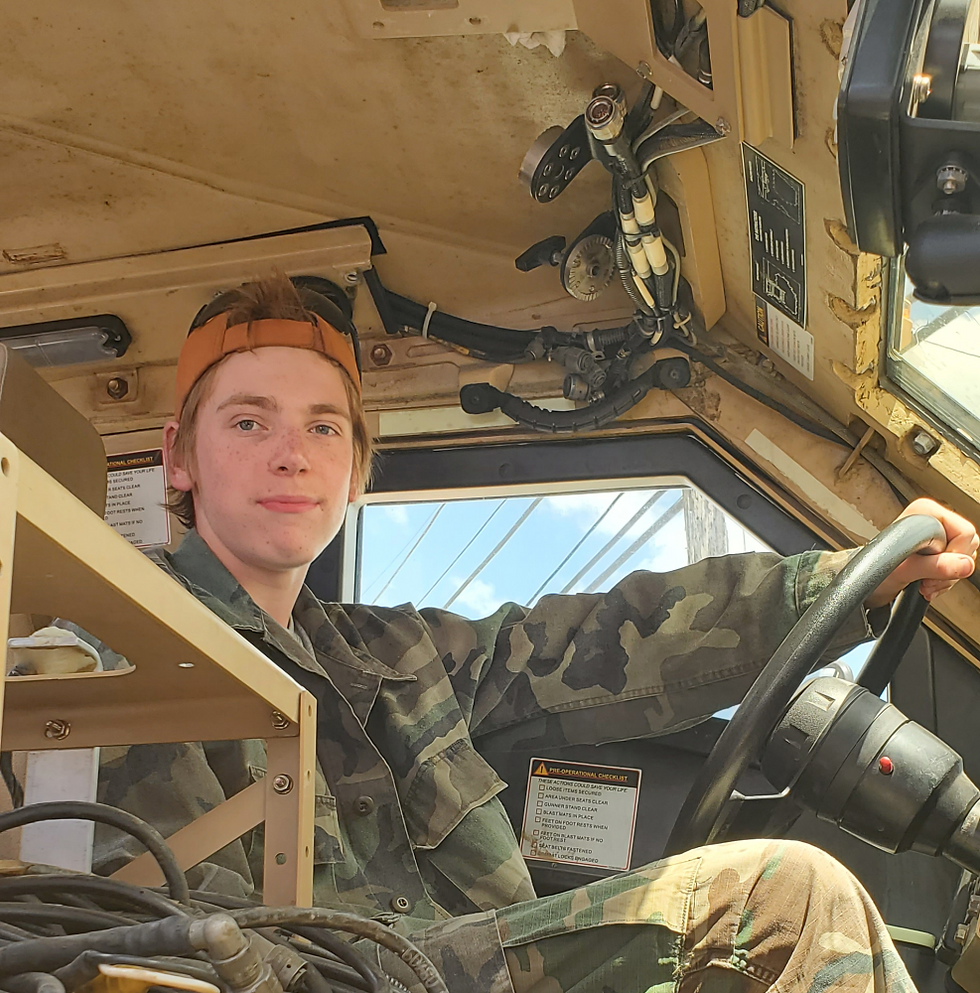RESPONDER SELF-CARE IS THE BEST HEALTHCARE
- EG Weiss

- Jun 10, 2023
- 6 min read
Updated: Jul 3, 2023
My dad always said that I preferred to learn the hard way. Of course as a young lad I thought he was an idiot and as I age, I am reminded more and more of how wise he really was. I miss him horribly and wish he was here now. The apple did not fall far from the tree and I am afraid that the similarities we shared may be part of the reason he is no longer here.

I recently wrote a blog on providing comfort for responders in the post-disaster environment and how it should be a priority if not a requirement. The job is hard and there is not enough being done to protect America’s heroes.
Public safety jobs can take a toll on physical health and we all know this, but did you know that just by BEING a responder you are at an elevated risk for hypertension, diabetes, and obesity? Your chances of having a heart attack – and having one when you’re young – are higher than the general population.
Regular physical examinations often detect problems lying in wait. For example, controlling your weight and blood pressure are keys to avoiding obesity and hypertension, both of which are potential early signs of bigger problems to come.
Unfortunately, in the responder realm we tend to make dumb decisions such as NOT having those check-ups. We are under constant self-imposed pressure to be “tough” so we ignore the little twinges, the chronic aches, the little mysterious jabs of pain. We shrug these things off as part of the job- usually until the twinges and jabs become immobilizing or worse.
There is a strange phenomena that occurs when we put on a uniform. Common sense, the stuff we preach about, suddenly does not apply to us. We know that healthcare and selfcare is important. We will advise it to anyone authoritatively, yet when it comes to us, we subconsciously decided that we are exempt from the advice because of the profession we enjoy.
Take firefighters for example. They are protecting us and the community around the clock knowing that any moment a floor or roof collapse, backdraft or explosion could take them away into eternity. The truth is that if that were to happen, it would be a pretty rare event. What is more probable is that this same hero, because of 24-hour shifts, will experience an increase in cardiometabolic diseases, such as heart disease and diabetes, as well as cancer.

Did you know that almost every cell in the body has a 24-hour biological clock that produces circadian (daily) rhythms? These rhythms regulate behavior (e.g., when to be active and when to rest) and physiology (e.g., blood pressure, blood sugar, muscle function). Circadian rhythms coordinate with the environment in part by regular, timed cycles of light and dark and eating and fasting. Disruptions to these cycles, which can occur with responder shift work and demands, can impact health, leading to obesity, heart disease, diabetes, and cancer.
According to the Centers for Disease Control and Prevention about 29.1 million Americans, or 9.3 percent, have diabetes. It is estimated that 8.1 million Americans, or 27.8 percent, have diabetes, but don’t know it.
Diabetes affects more men than women, and afflicts almost 30 percent in the over 65 age group. Although believed to be an under-reported cause of death, diabetes was still the seventh leading cause in the United States in 2010. In 2012, diabetic-related illnesses cost Americans more than $245 billion in health care costs. The worldwide cost of diabetes is $825 billion per year.
Diabetes is a group of diseases marked by high glucose levels resulting from problems in how insulin is produced or works. It may result in the development of serious complications such as heart disease, stroke, kidney failure, blindness and early death.
There are two types of diabetes: Type 1 and Type 2. Type 1 is usually diagnosed in the mid-teens, but can appear at any age. It develops when insulin-producing beta cells of the pancreas are destroyed. This is usually caused by abnormal functioning of the body's own immune system.
While Type 1 diabetes is a problem with insulin production, Type 2 diabetes is a problem with insulin resistance, and accounts for almost 95 percent of all diagnosed cases of in the United States.
The cells of the muscles, liver and fat tissue become resistant to insulin. The beta cells of the pancreas gradually lose the ability to produce adequate amounts of insulin.
The development of Type 2 diabetes places the body at risk for serious complications such as heart disease, stroke, blindness, peripheral nerve damage (diabetic neuropathy), kidney failure, and non-traumatic amputations.
Cardiovascular disease death rates are about 1.7 times higher, and hospitalization rates for heart attack are almost 1.8 times higher among adults diagnosed with diabetes than among adults without diabetes. The incidence of stroke is also 1.5 times higher.

Diabetics may also develop other complications such as nerve disease, non-alcoholic fatty liver disease, periodontal (gum) disease, hearing loss, erectile dysfunction, and to list a few.
The biggest risk factor for developing Type 2 diabetes is obesity, and oddly enough, studies show that the EMS profession sets the perfect framework for considerable weight gain. It is well known that night shifts and long work schedules that result in sleep deprivation are major components that contribute to the weight gain of healthcare workers.
Weight gain in EMS is a national issue. A recent study in Boston found that among new recruits for fire and EMS services, only 22 percent were at a healthy weight, while 44 percent were overweight and 33 percent were obese. More than 80 percent of FDNY workers are overweight or obese (Sorry guys- just reporting the findings!).
Cortisol is a fight or flight hormone that is released every time the body is stressed. Part of its purpose is to replenish energy after exertion through fighting or fleeing the perceived threat.
The body's neuro-endocrine system doesn't know that it is not physically fighting or fleeing, and it still responds to stress with the hormonal signal to replenish nutritional stores.
In another words, we feel hungry when we are stressed, our profession is nothing BUT stress, and so we follow the path to weight gain easier than most professions.
To complicate matters, the fuel your muscles need during the fight or flight response is glucose, a reason you crave carbohydrates when stressed. To move the glucose from our blood to our muscles requires more insulin.

If you are any kind of investigator, you might have just picked up on why there has always been a correlation between cops and donuts!
High levels of sugar and insulin set the stage for the body to store fat. People who are under frequent stress will gain weight for that very reason. Some research shows that abdominal fat causes specific chemical changes that can lead to lower metabolism and cravings for sweets, possibly leading to even more weight gain.
Waking up in the middle of the night to bright lights and loud whistles causes a tremendous release of cortisol as part of the stress response. Geez. Our professions are just perfect aren’t they? Chronically elevated cortisol will make the responder vulnerable to developing high blood pressure, diabetes, lowered immunity and weight gain.
Cortisol can cause an increase in appetite.
That’s right, we cannot win for losing. Now just add in the way we eat fast food, drink coffee 24 hours a day, drink while off-duty and consider our job “enough exercise”, you can see why we are all considered the high risk group out of all the professions.
I am not a doctor, and I do not have all the answers. I also have no real right to shout at all of you about any of this. This post was to create a wake-up call. If you listen to nobody else, if you are sick of the nagging, please just listen to me for a few moments here.
As I aged I slowed. As I slowed I grew. I was not concerned. I pushed and for a long time I was still out-running the young bucks. After a while longer I began to experience poor health. I no longer could pass the youngsters, but I pushed and could stay up for 36 hours while those pansies fell asleep standing on deployment. Then I started falling asleep. Not for a long time, just for minutes, but I could feel the weakness, the exhaustion and the brain fog. So I pushed…until I could not push anymore.

This past week, as I wrote previously, was one of discovery and admission. I had to admit that I had ignored good advice. I had ignored the science. I had allowed ego to govern my actions rather than my God-given sensors and clocks.
To all of you young responders out there: Now is the time to start taking care of yourselves. Now is the time to start watching each other and building relationships so that you can openly step in and say something to a partner or other crew member. This is not a game of survivor; if you think it is, you will not survive. This is a calling and the community you serve needs you to continue serving as long as you can.



Comments